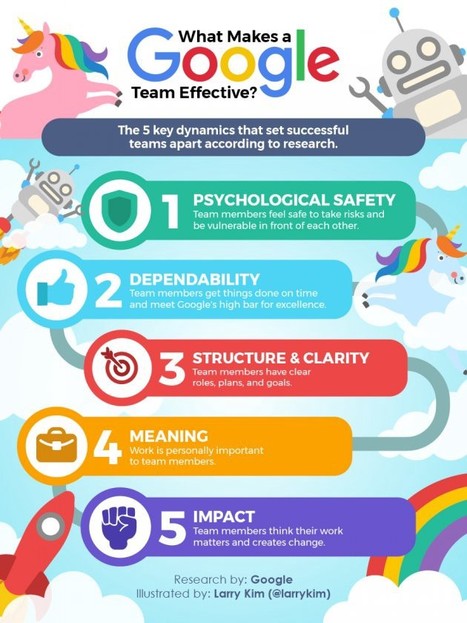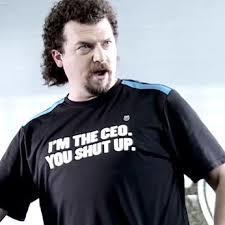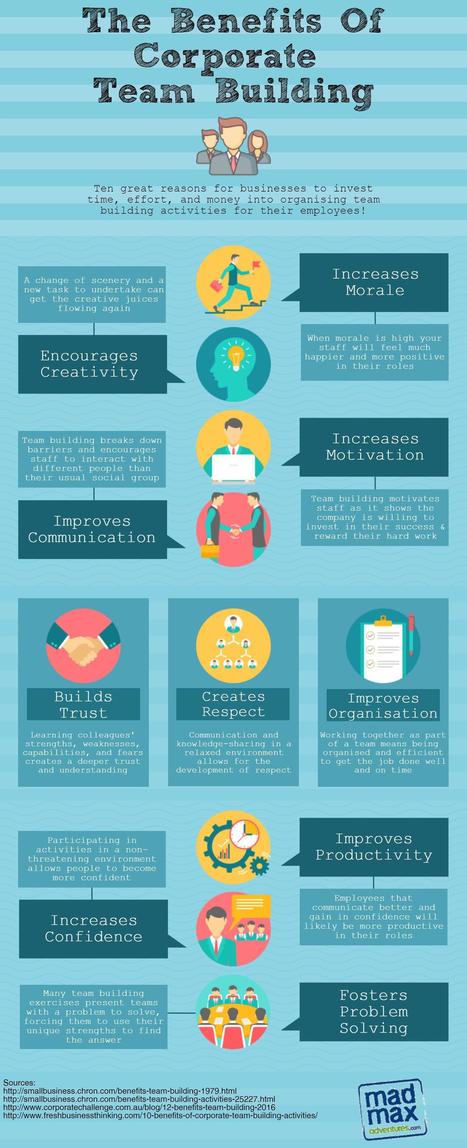 Your new post is loading...
 Your new post is loading...
It’s no surprise that Google, now part of Alphabet, loves data, and the company’s execs frequently share the revelations they find, such as their insights on mobile web use. But some of us would be surprised to discover that this unicorn company often turns its eye inward, analyzing information about its people to help improve its operations. A group of employees from Google’s People Operations section, the equivalent of an HR department, decided to complete an analysis to answer one question: What makes a Google team effective? Here’s a look at their approach and the startling revelations they had along the way.
Via The Learning Factor
We all want to learn and grow. Improving our skills and being exposed to new ideas not only makes us better at our jobs but makes us happier and more engaged at work. But with a full-time job, it can be tough to find the time and resources to dedicate to personal development. Some people, like me, are lucky to work for companies that encourage and even fund classes, sabbaticals, or fellowships. But if you work for a company that doesn’t have an official policy, how can you make the case to your manager (and the necessary higher ups) to support you?' Identify how you want to learn and grow. If you don’t yet have a clear picture of what you want to develop, spend time honing in on exactly what you need. Do you want to build your emotional intelligence skills to be a more attuned business leader? Are you interested in going on a yoga or meditation retreat? Set aside a specific period of time, such as one evening or even a week, to explore ideas and research what appeals to you. Write down what you want to learn and how you would grow from the experience you’ve identified. Research shows that the physical act of writing has a neurological effect on the brain which tells the cerebral cortex to “wake up and pay attention.” Writing stimulates a bunch of cells in the brain called the Reticular Activating System that plays a key role in being more conscious and alert. The more you can write down, the more aware and real your ideas become.
Via The Learning Factor
You’re ready to take that next step in your career, although you don’t technically have any management experience–yet. Sure, you know you’d be a great boss, but how can you get someone to give you a shot when don’t have any direct supervisory experience? While there’s no magic formula for landing a management role, there are a few things you can do to help employers see your potential.
Via The Learning Factor
Test your leadership skills with this quick quiz, and get a list of leadership skills you need to develop to become a really good leader.
Via Begoña Pabón
Ineffective listening can lead to damaged relationships, inefficient use of time and energy, and silos between key people in an organization. Here's how to improve your listening skills - fast!
Every organization—and every change management initiative—is unique. But these seven principles apply across the board, and they can improve an institution’s odds of realizing the envisioned benefits.
Download Seven principles for effective change management: Sustaining stakeholder commitment in higher education, to read the full article in PDF format.
Via David Hain
"We all behave in perfect alignment with our current level of emotional, psychological, and spiritual evolution. All our actions and relationships, as well as the quality and power of our leadership, accurately express the person we have become."
Via Jay, Mark E. Deschaine, PhD
Businesses face the dilemma dividing resources between protecting the current value chain and developing new value propositions that in time replace the old
As an inherently competitive species, we are greatly tempted to think of business as war or sport where one’s gains can only come at the expense of our rivals—where winning means the other guy is losing. (Or as Genghis Khan is often quoted: “It is not enough that I succeed. Everyone else must fail.”) Indeed, there are strong motivational benefits to rallying around “beat Coke” if you are Pepsi, “buy Detroit” if you are Chrysler, or a “holy war with Google” if you are Apple. But such “strategies” will only be successful if they spur their organizations to bring better products and total value propositions to their target customers.
Business is not war or sport. Strategy in business is different than strategy in war and sport. It’s not about competitors. It’s about the customer, your value proposition, and the capabilities you need to deliver it better than anyone else. It’s that simple—and that difficult.
Via David Hain
For me, as a manager of a large customer contact center, knowledge management is essential. In my working environment I see more and more organizations denying the need of additional investing in systems and approaches (which are very often established around the millenium). And that behaviour existed before the financial meltdown of 09/2008. Knowledge management…
Find out eight common mistakes that a woman made as a manager to other employees in her company and the lessons she learned from them.
Via Marc Wachtfogel, Ph.D.
There’s more than one kind of successful organization.
My team and I went to SavvyRoo, a cool site where people can enter their question and rank other people’s posts, and we asked leaders for their top question about workplace motivation.
Via Kevin Watson
|
You’re sitting there at your desk with a pit in your stomach. You know you really blew it–and your boss does, too. Maybe you forgot to follow up with an important client and they chose someone else’s proposal. Maybe you didn’t prepare the right documents in time for a super-important meeting. Or a careless typo you made on a spreadsheet or purchase order led to an expensive mistake. Whatever it is, your boss isn’t happy. That’s the bad news. The good news is that you don’t need to start job-searching. In fact, there are a few simple steps you can take right away to rebuild the trust you’ve lost–as quickly as humanly possible. Here’s what to do and when to do it.
Via The Learning Factor
One of the most difficult transitions for leaders to make is the shift from doing to leading. As a new manager you can get away with holding on to work. Peers and bosses may even admire your willingness to keep “rolling up your sleeves” to execute tactical assignments. But as your responsibilities become more complex, the difference between an effective leader and a super-sized individual contributor with a leader’s title is painfully evident. In the short term you may have the stamina to get up earlier, stay later, and out-work the demands you face. But the inverse equation of shrinking resources and increasing demands will eventually catch up to you, and at that point how you involve others sets the ceiling of your leadership impact. The upper limit of what’s possible will increase only with each collaborator you empower to contribute their best work to your shared priorities. Likewise, your power decreases with every initiative you unnecessarily hold on to.
Via The Learning Factor
Millennials have a reputation for being difficult to engage and retain. But could the core problem be with their leaders?
Via Marielvi Piñero
Organizations invest a lot of time and money in hiring the right CEO or senior executive to set a vision and make the changes in their company. Yet within the first 18 months, there’s a 50% chance the executive will leave the organization. This failure comes with enormous costs, not only in disruption to the organization but financially, too. One estimate puts the cost at 10 times the executive’s salary – sometimes more.
The reasons these individuals leave are many. They often cite poor cultural fit, inadequate onboarding, or the lack of appropriate expectations. But in reality, many new executives inadvertently set themselves up for failure within the first few months of their tenure through their own actions.
As an executive hired from outside the firm, you’ll naturally want to add value and assure your employers and employees that you are the right hire. But based on my work helping executives transitioning into new organizations, I’ve discovered common traps new executives tend to fall in, even as they try to solve problems, make decisions, and improve the company. Fortunately, there are ways to sidestep these traps so you can assimilate successfully into your new organization.
Via David Hain
WE LIVE IN TIMES OF GREAT CHANGE
Have you heard this before—say in the last hour? Did you know that when a laptop detects a CEO about to type a speech, it automatically enters: “We live in times of great change.” Why bother the CEO to type it again, since just about every management speech in the past few decades has begun with this line. That never changes.
Do we really live in times of great change? Look around and tell me what’s changed fundamentally. Your food, your furniture, your friends, your fixations? Are you wearing a tie, or high heels? How come: because you always have? How about your car? Under the hood is probably a four-cycle, internal combustion engine. That was in the Model T Ford.
When you got dressed this morning, did you say to yourself: “If we live in times of great change, how come we are still buttoning buttons?” (from Wikipedia: “Functional buttons with buttonholes for fastening or closing clothes appeared first in Germany in the 13th century”.)
What’s my point? That we only notice what is changing, and most things are not. Of course, some things are changing: information technology, most notably. Zap, I hit a few keys and Wikipedia tells me about buttons. I hope you have taken notice of this new technology, because it is rendering great changes. But I hope that you are also taking notice of all the things that are not changing, because they are no less important. Managing change without managing continuity is anarchy.
Via David Hain
How do you view employees? We rarely talk about this in public forums or meetings, but we have no problem giving people our opinion in the hallway!! We wanted to stem the tide of side conversations at the March HR Roundtable (of Cincinnati) and took on the topic “Employee relations, and how to
Via Anne Leong
Before you start to redefine your role, it’s vital to leverage your current seat at the table to help achieve greater organizational performance.
Via Coloma Canals
Leadership development programs often include retreats, classes, webinars, and other formal learning opportunities. But what happens before and after those formal programs has a major impact on the “return on learning” for participants?
When bosses are more engaged with their direct reports’ leadership development and more supportive of it, participants report they get more value. Our survey looked at 4 outcomes of leadership development: self-awareness, leadership capability, leadership effectiveness, and engagement. We also asked them about how supportive their bosses had been.
Those participants who rated support from their bosses as high had better outcomes than those who rated their boss support as moderate or low. In fact, those who rated their boss support as low tended to report program outcomes below the average level for all participants.
For example, in the engagement outcome, which measures how engaged participants felt at work because of the program, those with high boss support reported an average score of 8.1 (on a 10-point scale); those with low boss support reported an average of 6.5, or 21% lower.
Via David Hain
New management research shows a strong connection between employee appreciation and retention - and the connection is strongest among millennials.
Via Anne Leong
In The Essential Drucker — an excellent intro to Drucker’s prolific writings (over 30 books!) — there’s an entire chapter devoted to his method of time management.
I’ve used a variant Drucker’s method on and off for a while now. When I do use it, I am a productive beast, averaging 7–8 hours of quality work a day. When I don’t, I average 2–3 hours — no better than the average American.
Let’s take a look at Drucker’s method.
Via David Hain, Marc Wachtfogel, Ph.D.
The 2017 Deloitte Global Human Capital Trends report reflects seismic changes in the world of business. This new era, often called the Fourth Industrial Revolution1—or, as we have earlier labeled it, the Big Shift2—has fundamentally transformed business, the broader economy, and society.
We title this year’s report Rewriting the rules for the digital age because a principal characteristic of the new era is not merely change, but change at an accelerating rate, which creates new rules for business and for HR. Organizations face a radically shifting context for the workforce, the workplace, and the world of work. These shifts have changed the rules for nearly every organizational people practice, from learning to management to the definition of work itself.
All business leaders have experienced these shifts, for good or for ill, in both their business and personal lives. Rapid change is not limited to technology, but encompasses society and demographics as well. Business and HR leaders can no longer continue to operate according to old paradigms. They most now embrace new ways of thinking about their companies, their talent, and their role in global social issues.
We have developed a “new set of rules” to make sense of this changing landscape. These rules reflect the shifts in mind-set and behavior that we believe are required to lead, organize, motivate, manage, and engage the 21st-century workforce. While it is hard to predict which emerging business practices will endure, it is impossible to ignore the need for change. This report is a call to action for HR and business leaders, who must understand the impact of change and develop new rules for people, work, and organizations.
Via David Hain
|



 Your new post is loading...
Your new post is loading...






































It’s no surprise that Google, now part of Alphabet, loves data, and the company’s execs frequently share the revelations they find, such as their insights on mobile web use. But some of us would be…
Google's Five Dynamics of team effectiveness are applicable to creating effective safety cultures as well. Dynamic 1 - psychological safety is of particular importance because so often employees fear speaking up about safety concerns.